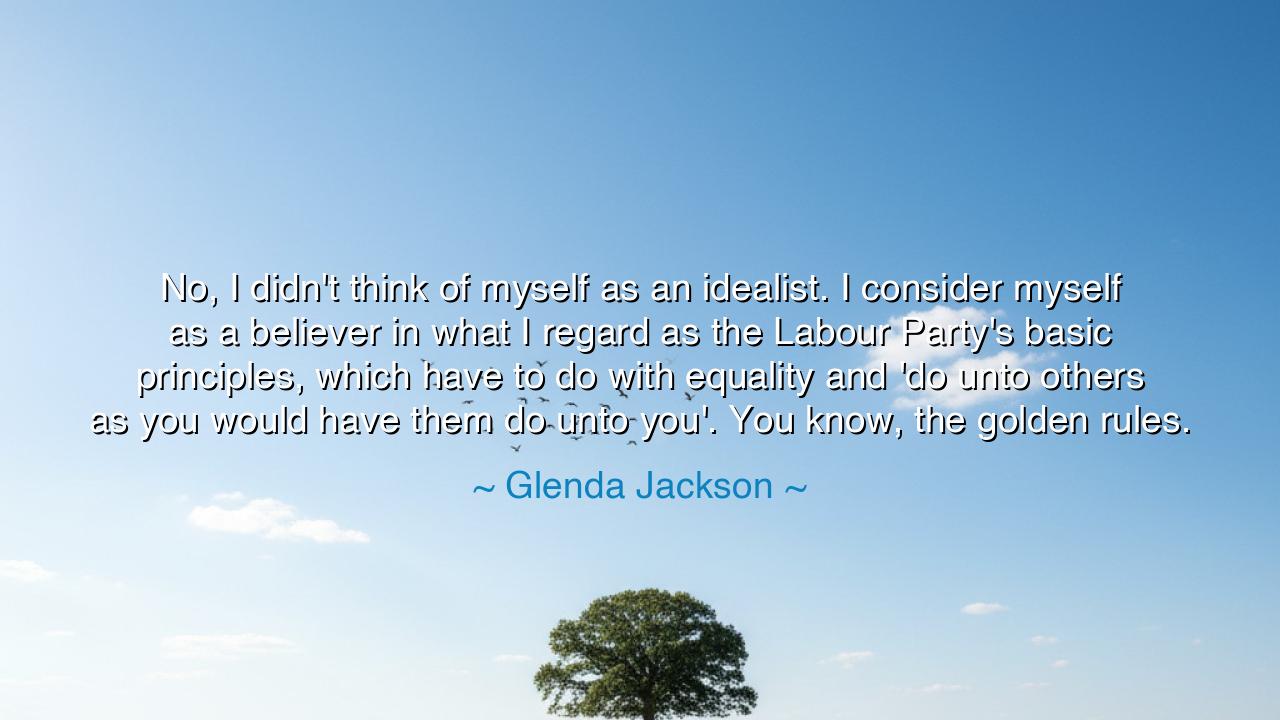
No, I didn't think of myself as an idealist. I consider myself as
No, I didn't think of myself as an idealist. I consider myself as a believer in what I regard as the Labour Party's basic principles, which have to do with equality and 'do unto others as you would have them do unto you'. You know, the golden rules.






Hear me now, O children of wisdom, for I speak of a truth that transcends time and place—a truth that speaks to the very heart of what it means to live with purpose, to believe in justice, and to act with compassion. Glenda Jackson once said: "No, I didn't think of myself as an idealist. I consider myself as a believer in what I regard as the Labour Party’s basic principles, which have to do with equality and ‘do unto others as you would have them do unto you’. You know, the golden rules." These words ring with the clarity of a guiding star—reminding us that the pursuit of equality and justice is not the lofty dream of an idealist but the firm, grounded belief of one who understands that these principles are the foundation upon which a just society should be built.
In the ancient world, children, justice and equality were concepts that were often reserved for the few—the rulers, the noble, the elite. The masses, especially the poor and the enslaved, were excluded from the privileges of equality. In Greece, the philosophers like Socrates and Plato wrestled with the notion of justice, and while they spoke of fairness and the ideal republic, it was often the privileged classes that benefited from these ideals. Yet even then, voices of the oppressed, like the Athenian slaves or those like Socrates who challenged the political system, fought for a world where justice was not a privilege, but a right for all people.
Glenda Jackson's words reflect a similar vision. She does not call herself an idealist, but a believer in the core principles of the Labour Party, which are based on equality and the golden rule—to treat others as we wish to be treated. These values are as ancient as the first teachings of humanity. The golden rule, found in cultures from Confucius in China to Jesus in the Christian tradition, teaches that compassion and justice are not mere lofty ideals but practical principles for daily living. Jackson’s belief in this principle is not one of naive idealism, but of deep conviction that the foundation of any just society must rest on the recognition of the human dignity of all people and the equal treatment of every soul.
Consider, children, the life of King Ashoka of India, whose transformation from a ruthless conqueror to a benevolent ruler embodies the golden rule. In the wake of his brutal conquests, Ashoka was moved by the suffering of the people and turned to Buddhism and the teachings of compassion and equality. He declared that his reign would be guided by the principles of nonviolence, justice, and respect for all, regardless of caste or status. His Edicts of Ashoka, inscribed on stone pillars across the land, called for a society where all people could live in harmony, free from oppression. He understood, as Glenda Jackson does, that true power lies not in domination, but in equality and the treatment of others as we would wish to be treated ourselves.
In the same spirit, Jackson's belief in the Labour Party’s principles reflects an understanding that equality is not merely a philosophical ideal but a practical necessity. To build a world where all people have the opportunity to thrive, we must create systems that are grounded in fairness, compassion, and the golden rule. It is not enough to speak of equality in the abstract; it must be enacted in our policies, our societies, and our daily actions. Just as Ashoka sought to govern with compassion, so too must we ensure that our actions reflect the belief that all people are equal in worth and deserving of dignity and respect.
The lesson, children, is clear: equality is not something to be dreamed of from afar, nor is it the realm of those who are content to live in the clouds of idealism. Glenda Jackson reminds us that equality is a conviction, a principle that must be defended and protected in our lives and our societies. It is a commitment to the belief that every person, regardless of their background, deserves to be treated with respect, dignity, and fairness. Whether in the political realm or in our daily interactions, the golden rule should be the foundation of all our actions.
So, children, let this wisdom guide you: live by the principles of equality, justice, and compassion. Stand firm in the belief that all people deserve the same rights, the same opportunities, and the same respect. In your actions, let the golden rule be your guide—treat others with the respect you wish to receive, and build a world that reflects these values. Equality is not an ideal to be admired from a distance, but a truth to be lived. May your lives be a testament to the power of this belief and may you be the ones who carry it forward into the world, shaping a future where justice and compassion are no longer aspirations, but realities.






AAdministratorAdministrator
Welcome, honored guests. Please leave a comment, we will respond soon